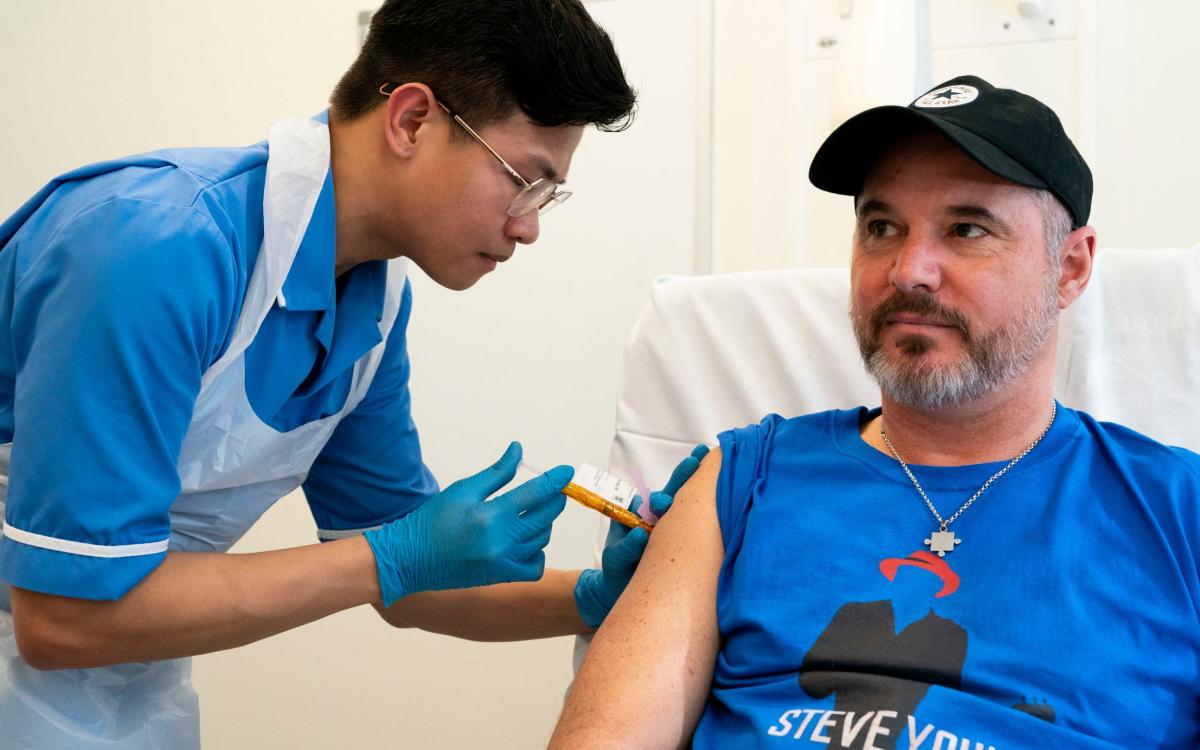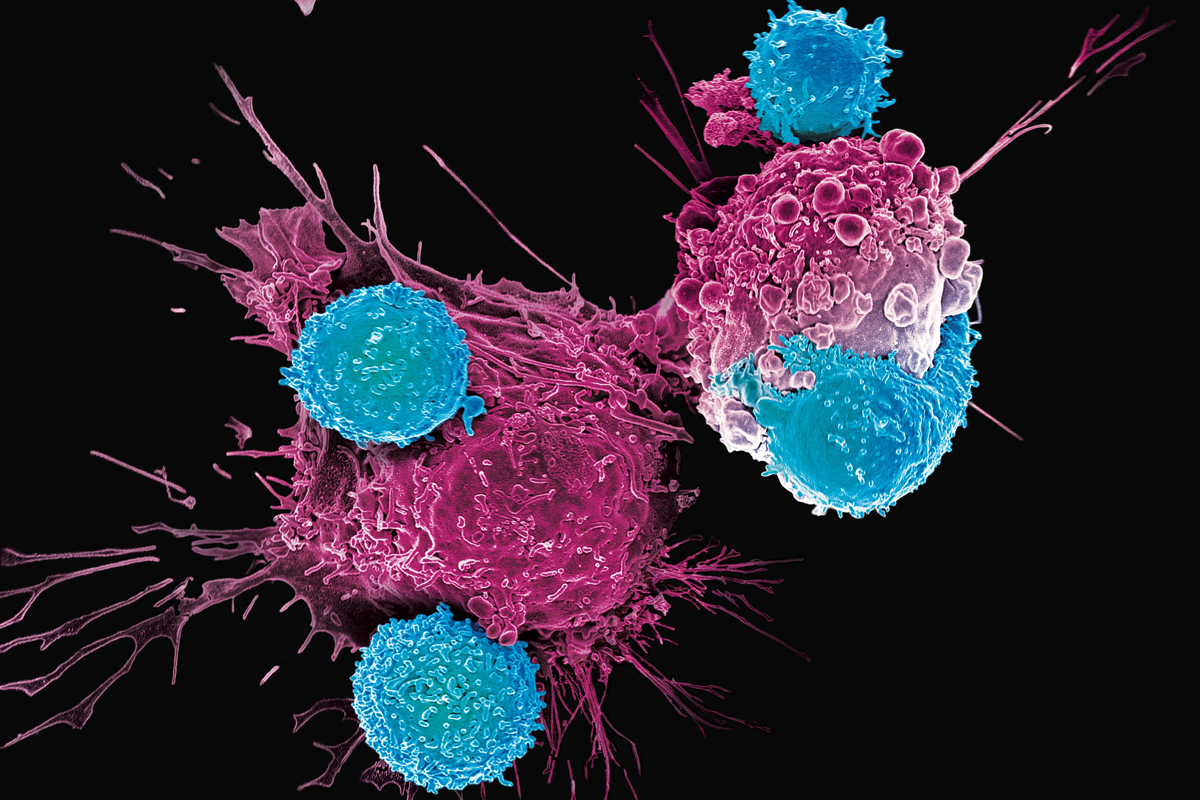-
 News
A real breakthrough in melanoma treatment: a personalized mRNA vaccine trial
News
A real breakthrough in melanoma treatment: a personalized mRNA vaccine trial
-
 Medical articles
CAR T therapy: helps treat cancer when other methods fail
Medical articles
CAR T therapy: helps treat cancer when other methods fail
-
 Medical articles
Cancer incidence is steadily increasing: disappointing WHO forecast for 2050
Medical articles
Cancer incidence is steadily increasing: disappointing WHO forecast for 2050
-
 Medical articles
Stem cells bring hope to millions of people suffering from hearing loss
Medical articles
Stem cells bring hope to millions of people suffering from hearing loss
-
 Medical articles
TOP 10 clinics for oncology treatment 2023
Medical articles
TOP 10 clinics for oncology treatment 2023
All news
Thyroid cancer treatment
Thyroid cancer (TC) produces abnormal cells that form a tumor. This tumor can affect the neighboring lobe of the thyroid gland, as well as spread to lymph nodes in the neck and distant organs.
Thyroid cancer rarely gives rise to metastases. Early detection of a thyroid tumor provides a quick and effective complete cure with treatments such as surgical removal and radioiodine therapy. In the early stages, the effectiveness of treatment reaches 95-97%.
In foreign clinics, thyroid cancer is diagnosed within 3-4 days. After diagnosis, the patient can begin treatment immediately, without having to wait their turn.
MedTour patients recommend clinics for the treatment of thyroid cancer:
Doctors for the treatment of thyroid cancer
Patient reviews
My mom had a mastectomy at the Samsung medical center. We were very worried, but everything went well. MedTour helped us get to the clinic and hired a transfer. The clinic is of a high class, my mother was pleased with the treatment, the conditions of the ward and the service.
I had prostate cancer and I decided to have a surgerv in Medipol clinic. I have heard about it from my friends to did the same surgery here. I was amazed about modern technology in this hospital! Doctors and nurses are super polite and educated. Everyone speaks english and is ready to help in every situation. My turkish surgeon was the best doctor, which I have ever met in my life. Results of the surgery are estounishing. I feel myself great and I am very thankful to MedTour for organizing my medical trip!
Frequently Asked Questions
Thyroid cancer is a cancerous disease in which a tumor forms in the body of the thyroid gland. Normally, the thyroid gland is located at the base of the neck under the larynx and in front of the trachea. It consists of two lobes that are connected by an isthmus and together resemble the shape of a butterfly.
The tumor may affect one of the lobes in isolation or spread to both thyroid lobes. Thyroid cancer in its early stages can be treated quickly and effectively abroad with surgery and radioiodine therapy.
Depending on how the tumor cells look under the microscope and what kind of structure they have, thyroid cancer can be divided into these types:
- Differentiated thyroid cancer,
- Medullary,
- Anaplastic.
Accurate diagnosis of a particular form of thyroid cancer is important for the subsequent choice of treatment tactics and the expected prognosis.
Differentiated thyroid cancer
The vast majority of malignant thyroid tumors are differentiated. This means that tumor cells microscopically look very similar to normal thyroid tissue. To the differentiated form, specialists refer papillary and follicular thyroid cancer.
Papillary tumors occur on average in 8 out of 10 patients who are first diagnosed with thyroid cancer. This form of cancer tends to grow slowly and usually develops in only one lobe of the thyroid gland. Papillary cancer can spread to the lymph nodes in the cervical area. Even so, it is well-treated and rarely fatal.
Follicular cancer, or follicular carcinoma, is a less common form. It occurs in about 1 in 10 cases of thyroid cancer. Follicular carcinoma does not spread to the lymph nodes in the neck. However, this form tends to spread through the blood vessels to other organs and tissues.
Medullary thyroid cancer
This type of thyroid cancer occurs in 4% of cases and arises from C-cells, which are normally responsible for producing the hormone calcitonin. Medullary cancer often spreads to the surrounding lymph nodes, lungs, or liver even before the primary node is found during diagnosis.
Specialists distinguish between sporadic and familial forms of medullary cancer. The sporadic form occurs most often in older people and mainly affects one of the lobes of the thyroid gland.
The familial form of medullary thyroid cancer is hereditary and can occur in 25% to 25% of each generation. In this case, patients become ill in childhood or early adulthood. The tumor may affect several areas, affecting both lobes of the thyroid gland. Familial medullary cancer is associated with an increased risk of developing tumors of a different area and cell type.
Anaplastic thyroid cancer
In 2% of cases, a patient may be found to have anaplastic or undifferentiated form of thyroid cancer. Its name is due to the structure of the cells, which on microscopic examination have a sharp atypia and do not resemble normal cells of the human body. Anaplastic cancer spreads rapidly to the lymph nodes in the neck and surrounding tissues and is difficult to treat.
Patients with thyroid cancer may have one or more of these symptoms, such as:
- A mass, soft or firm in texture, that is palpable on the front surface of the neck,
- General swelling and puffiness in the neck area,
- Pain in the neck area, which may extend to the ears,
- Hoarseness or other voice changes that do not go away or change over time,
- Difficulty swallowing,
- Problems with breathing,
- Persistent cough that is not related to colds
These symptoms are not specific to thyroid cancer and can be seen with other conditions. If you are experiencing any of these symptoms, you should talk to your doctor to discuss the issue.
The stage of growth and spread of thyroid cancer differs depending on whether the cell structure of the tumor is differentiated, medullary, or anaplastic. The stage of thyroid cancer is also affected by the patient’s age – before or after 55 years of age.
In the first stage of differentiated (papillary and follicular forms) thyroid cancer, the tumor does not exceed 2-4 cm in cross-section and does not spread to distant tissues and organs, and does not affect the cervical lymph nodes.
The second stage of cancer is characterized by an increase in tumor more than 4 cm in diameter, but the tumor does not spread beyond the thyroid gland and does not affect remote tissues and organs. Lymph nodes in the neck may be involved in the cancer process or remain intact.
If the tumor spreads beyond the thyroid gland, experts put the third stage. Nearby tissues in the neck, such as the larynx, trachea, esophagus, or nerve fibers, may be affected.
At the fourth stage of thyroid cancer foci of metastasis are found in distant lymph nodes, internal organs and tissues of the patient. Stage 4 can also be diagnosed in cases where the tumor has spread beyond the thyroid gland toward the spine or nearby major vessels.
The follicular form of thyroid cancer, which occurs in 10-15%, can spread through the bloodstream to distant organs and tissues. Thyroid cancer most often metastasizes to the bones and lungs.
Thyroid cancer requires diagnosis and treatment in specialized oncology departments. They must be equipped with a modern pathatomic laboratory, and have a specialized radiology department where radiolabeling can be done.
MedTour patients most often choose clinics in Turkey, Germany, Israel, South Korea, Spain, and Austria for thyroid cancer treatment.
In order to undergo diagnostics and treatment of thyroid cancer, as well as to consult with a specialist or to confirm an earlier diagnosis, you need to leave an application on the MedTour website.
You will be contacted by a medical coordinator who will help you decide on the clinic where you want to undergo further treatment. You will be able to provide medical documentation which will be reviewed by a medical specialist at one of the foreign clinics.
After evaluation of your medical history, the clinic will give you a preliminary price for diagnosis and treatment and invite you for treatment.
MedTour team helps patients to arrange transfer, air tickets and accommodation in apartments next to the clinic without any extra charge.
Thyroid Cancer (TC) Diagnosis and Treatment by the American Cancer Society (ACS 2021)
How is thyroid cancer diagnosed?
Specialist consultation
At the initial consultation with a medical oncologist, the doctor will take a detailed history, ask about your complaints and review your medical history. If any of your family members have had thyroid cancer (medullary form) or pheochromocytoma, you should tell your doctor because you may be at high risk.
Ultrasound
Ultrasound helps doctors examine abnormal nodes to clarify their density and size. An ultrasound can be used to determine if the mass is solid or filled with fluid.
Under the supervision of an ultrasound, doctors can perform tissue sampling for later examination under a microscope. This is especially helpful in cases where the abnormal mass is small.
Radioisotope scan with iodine (I-131)
In some cases, specialists may examine the thyroid using radioactive iodine. The patient is offered the drug in pill form or injected directly into a vein.
The iodine injected is naturally accumulated by the cells of the thyroid gland. So-called “hot” thyroid nodules, which accumulate more iodine than normal cells, are not malignant tumors. Cancerous cells absorb less iodine and look like “cold” nodes when scanned.
The radioisotope scanning method is not specific for diagnosing cancer and is necessary for differential diagnosis of the cancer process with other thyroid diseases.
Chest X-ray
The doctor may order a chest X-ray to see if the tumor has spread to the lungs. This is done if the patient has been diagnosed with follicular thyroid cancer, which is more likely to metastasize to the bones and lungs.
Computed tomography (CT scan)
Computed tomography is an additional diagnostic modality that is less preferable to MRI. However, it may be prescribed to assess the size, localization, and spread of a primary tumor and to track possible lung metastases.
Magnetic resonance imaging (MRI)
MRIs provide high-quality, detailed images of all parts of the body layer by layer. This gives doctors information about the extent to which the tumor has spread beyond the primary location. MRI is often prescribed if you want to evaluate the spread of a tumor into the brain or spinal cord.
Positron emission tomography (PET)
A PET scan can be useful if a thyroid tumor does not absorb radioactive iodine during the examination. In this situation, a PET scan can determine if the cancer has spread to distant organs.
Biopsy and cytogenetic study
When thyroid cancer is suspected, the “gold standard” of diagnosis is a biopsy. During a biopsy, the doctor takes a special thin needle to take a number of cells from a pathological site of the thyroid gland.
In order for the test to be more informative, aspiration of cells is done in several places of the alleged tumor. After which the material is analyzed in a special laboratory. Sometimes the results of the test are not informative, and if the doctor suspects thyroid cancer, a biopsy may be performed repeatedly, or the patient is advised to have the node removed followed by a histologic study.
Specialists may order additional tests on samples taken during the biopsy. The tissue is tested for genetic mutations in the BRAF or RET/PTC genes. Finding mutations makes thyroid cancer much more likely. The presence of mutations in the genes gives doctors information about which targeted (targeted) drugs will be most effective for the patient.
Laboratory blood tests
For thyroid cancer, the following laboratory blood tests may be ordered:
- Thyrotropic hormone (TSH),
- T3 and T4 (thyroid hormones),
- Thyroglobulin,
- Calcitonin,
- Carcinoembryonic antigen (S-CEA).
The results of laboratory blood tests supplement the clinical picture and help doctors tailor a treatment program according to the patient’s current condition and stage of the disease.
How are thyroid cancer treatment methods abroad?
Surgical treatment
Removing a thyroid tumor is the primary treatment for all types of cancer, except for some anaplastic forms. The doctor may suggest one of the following surgeries:
- Lobectomy (removal of one lobe of the thyroid gland). If the tumor has not spread beyond one lobe, a lobectomy is preferable because some patients may not take thyroid hormones permanently after surgery.
- Thyroidectomy. This surgery removes the entire thyroid gland. This is the most common option for surgical treatment.
- Removal of lymph nodes. If the tumor has spread beyond the thyroid gland to the lymphatic system – the doctor performs a total removal of the thyroid gland along with some lymph nodes of the neck. This is to ensure that the cancer does not come back again. Such a phenomenon is called recurrence.
Radioiodine Therapy
Normally, iodine is absorbed and processed by thyroid cells. Using iodine, the cells produce hormones that help the body function normally throughout the day.
During radiodotherapy, radioactive iodine is injected into the patient’s body, which accumulates in the thyroid cells. The tumor cells are destroyed without significant damage to the surrounding tissues. Radioactive iodine is injected intravenously or as a capsule that the patient swallows.
Radioiodine therapy helps avoid future cancer recurrence because the radiation destroys residual tumor cells that were not removed during surgery. This technique is effective if the cancer has spread beyond the primary focus to lymph nodes and tissues.
External radiation therapy
Medullary and anaplastic forms of thyroid cancer do not absorb iodine. In this situation, radiotherapy will be powerless, and therefore contraindicated for patients. For these forms of thyroid tumor, as well as in cases of metastasis to distant organs, patients are offered radiation therapy.
External beam radiation therapy uses high-energy beams (or particles) to destroy cancer cells or slow their growth. A carefully focused beam of radiation is delivered from a machine that is outside the patient’s body.
External radiation therapy is usually given 5 days a week for several weeks.
Chemotherapy
Chemotherapy is rarely used in thyroid cancer therapy. It is indicated in cases of anaplastic thyroid cancer in combination with radiation therapy, and in metastatic tumors that do not respond to standard therapy protocols.
Drugs used in the treatment of thyroid cancer include:
- Dacarbazine,
- Vincristine,
- Cyclophosphamide,
- Doxorubicin,
- Streptozocin,
- Fluorouracil,
- Paclitaxel,
- Docetaxel,
- Carboplatin.
Targeted therapy.
Modern cancer therapy uses new drugs that act directly on the life cycle and growth of tumor cells. These drugs are known as targeted drugs because they have a specific target that they affect.
The following groups of drugs are used in the treatment of thyroid cancer:
- Multikinase inhibitors – Lenvatinib (Lenvatinib) and Sorafenib (Nexavar).
- RET-protein inhibitors – Selpercatinib (Retevmo)
- NTRK gene inhibitors – Larotrectinib (Vitrakvi) and Entrectinib (Rozlytrek)
Targeted medications are prescribed to patients when surgery and radiotherapy have not been effective or are not expected to be of significant benefit in the future. This situation can occur with anaplastic and metastatic cancer.
Published:
Updated:


Information on this webpage verified by the medical expert





Рудченко Олексадр Украіна. Велике спасибі за професіоналізм та чуйність до всього колективу відділення, особливо лікарю Марісу Межецкісу. Лікування відбувалося у січні 2023 року.